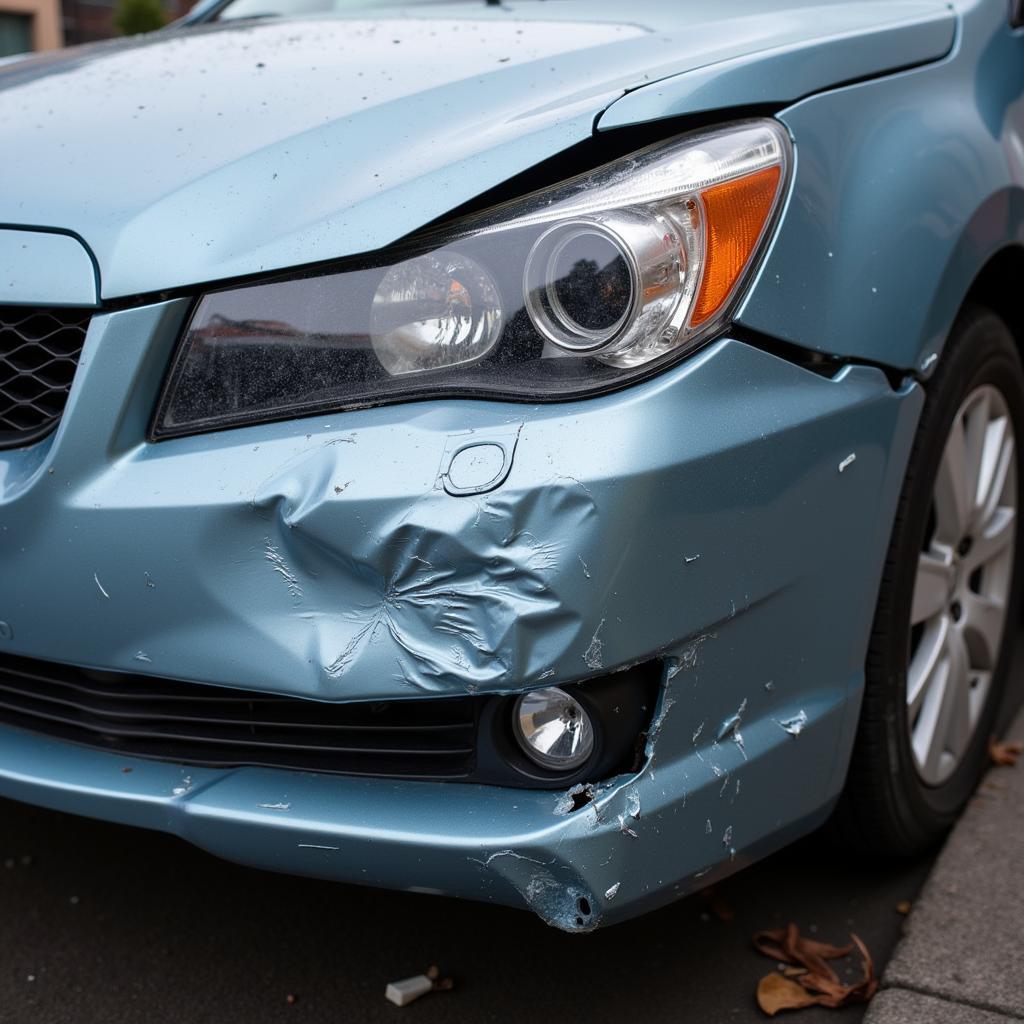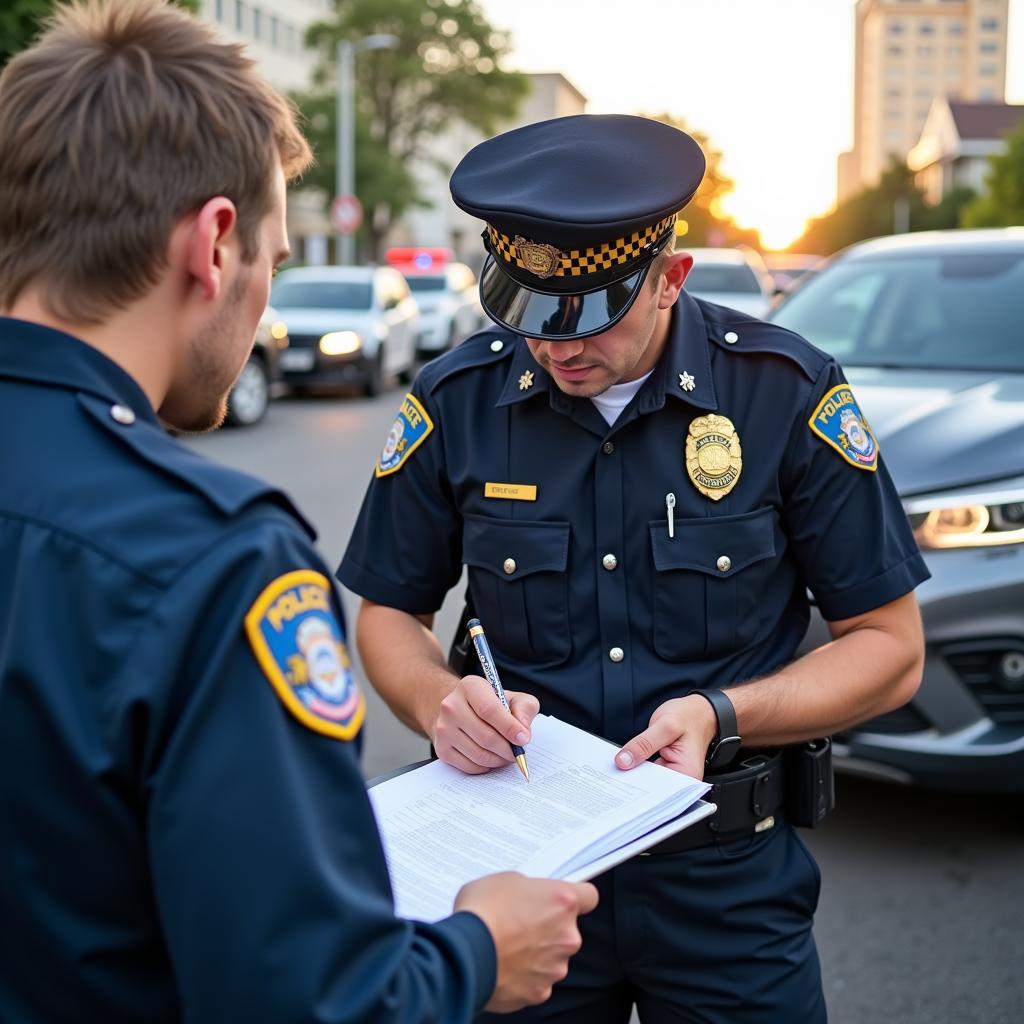After a car accident, exchanging the right information is crucial, not just for insurance purposes, but also for legal and personal record-keeping. Knowing What Details Do You Exchange After A Car Accident can help ensure a smoother claims process and protect your rights. This article will guide you through the essential information you need to gather at the scene, offering practical advice and expert insights.
Navigating the aftermath of a car accident can be stressful. what details do you need in a car accident. From assessing the damage to dealing with insurance companies, there are many steps involved. One of the most important initial steps is gathering the correct information from the other parties involved.
Essential Information to Exchange at the Scene
Exchanging information promptly and accurately can significantly impact your insurance claim and potential legal proceedings. Here’s a breakdown of the must-have details:
- Driver’s License Information: This includes the full name, address, and driver’s license number of all drivers involved. This information confirms the identity of the drivers and allows you to easily contact them later.
- Insurance Details: Obtain the insurance company name, policy number, and contact information. This is vital for filing your claim. Remember to what details to swap in car accident is vital for a smooth process.
- Vehicle Information: Note down the make, model, year, color, and license plate number of each vehicle involved. This helps identify the vehicles and assess the damage accurately.
- Contact Information of Witnesses: If there were any witnesses to the accident, gather their names and contact information. Independent witness testimony can be incredibly valuable in supporting your account of the incident.
- Location and Time of Accident: Record the precise location of the accident and the time it occurred. This information helps establish the context of the incident and can be crucial for investigations.
- Photos and Videos: If possible, take photos and videos of the damage to all vehicles involved, the accident scene, and any visible injuries. Visual documentation can significantly strengthen your claim and provide evidence of the extent of the damage.
Understanding Your Rights and Responsibilities
Knowing your rights and responsibilities after a car accident is crucial for protecting yourself and ensuring a fair outcome.
What to Do Immediately After an Accident
- Check for Injuries: Prioritize the safety and well-being of yourself and others involved. Seek medical attention if necessary.
- Contact the Police: Even in minor accidents, it’s important to report the incident to the police. A police report provides an official record of the accident and can be helpful for insurance purposes.
- Do Not Admit Fault: Avoid admitting fault or discussing the specifics of the accident with anyone other than the police and your insurance company.
- Gather Information: Exchange information with the other drivers involved, as detailed in the previous section.
 Documenting Car Accident Damage
Documenting Car Accident Damage
Dealing with Insurance Companies
- Report the Accident Promptly: Contact your insurance company as soon as possible to report the accident and provide them with the information you gathered.
- Cooperate with the Investigation: Answer all questions truthfully and provide any requested documentation. However, do not speculate or admit fault.
- Review Your Policy: Familiarize yourself with your insurance policy and understand your coverage and deductibles.
Commonly Asked Questions
What if the other driver refuses to exchange information?
If the other driver refuses to cooperate, try to obtain their license plate number and contact the police immediately. how to find details of car owner from number plate. This is especially important if the other driver leaves the scene without exchanging information.
What if the accident occurs on private property?
Even if the accident occurs on private property, it’s still important to exchange information and, if necessary, file a police report.
Do I have to exchange insurance details for a scratched car? do you have to exchange insurance details scratched car. Yes, regardless of the severity of the damage, it’s important to exchange insurance details with the other driver. Even minor scratches can lead to costly repairs.
“Accurate and detailed documentation is key to a smooth claims process,” says John Smith, Senior Claims Adjuster at ABC Insurance. “The more information you have, the better equipped you are to protect your interests.”
 Car Accident Police Report
Car Accident Police Report
Conclusion
Knowing what details do you exchange after a car accident is essential for anyone who drives. By following the steps outlined in this article, you can ensure that you are prepared to handle the aftermath of an accident effectively. Remember to prioritize safety, gather information thoroughly, and contact your insurance company promptly. what details should you exchange in a car accident. It is crucial for a smooth insurance process.
FAQ
- What if I don’t have my insurance information with me at the time of the accident?
- What if the other driver is uninsured?
- Should I move my vehicle after an accident?
- What if I disagree with the police report?
- How long do I have to report the accident to my insurance company?
- What if I am injured in the accident?
- What should I do if the other driver is aggressive or hostile?
Need more information? Check out our other articles related to car accidents and insurance claims.
Need assistance? Contact us via WhatsApp: +1(641)206-8880 or Email: [email protected]. We offer 24/7 customer support.

Leave a Reply